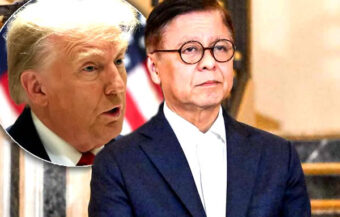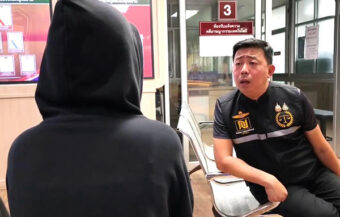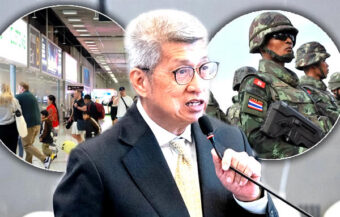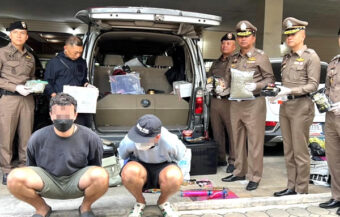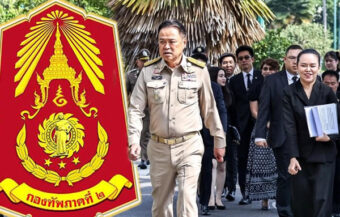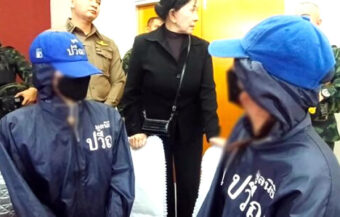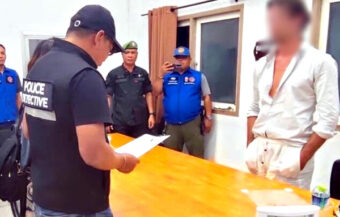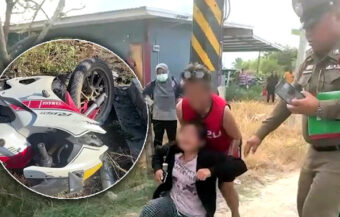Former minister and party leader Khunying Sudarat warns that Cambodia’s Scammer network is funnelling ฿20 billion in black capital to buy the 2026 Thai election, infiltrate politics, seize power and manipulate the economy, posing a major national threat.
A former cabinet minister and Thai Sang Thai Party leader, Khunying Sudarat Keyuraphan, warned on Sunday that the Cambodian scam network is aiming to seize power in Thailand. She said black capital totalling ฿20 billion is being funnelled to manipulate the 2026 General Election, as invisible forces behind the Cambodian network infiltrate Thailand’s politics, corridors of power, and economy. Leading People’s Party figures, including firebrand MP Rangsiman Rome, share her concerns. As a result, the looming 2026 election could centre on the “Scambodia” threat to Thailand’s sovereignty.

Former Pheu Thai Minister and Thai Sang Thai Party leader Khunying Sudarat Keyuraphan warned on Sunday that Thailand’s democracy faces a serious threat. She said the threat comes from back-capital networks linked to Cambodian scam operations, which aim to influence Thai politics.
Furthermore, she claimed these networks are planning to buy the 2026 election using “black capital” obtained from illicit schemes abroad. Khunying Sudarat emphasised that immediate government action is necessary to prevent these networks from consolidating political influence.
Her comments echoed those of Rangsiman Rome, the People’s Party firebrand and chair of the House Committee on National Security, Border Affairs, National Strategy, and Reform. He said that the Cambodian scam industry is now a central issue in Thailand’s upcoming election.
People’s Party warns of illicit transnational funds from Cambodia targeting Thailand’s political arena
Consequently, his party considers it vital to monitor illicit financial flows and prevent transnational criminal networks from infiltrating politics. Similarly, People’s Party economic spokeswoman Sirikanya Tansakul said that her party stands alone as a political force not tainted by grey capital or foreign financial interests.
On Sunday, Rangsiman told reporters that the People’s Party is open to engagement with Pheu Thai regarding any potential confidence motions in government. Meanwhile, newly elected Pheu Thai Party leader Julapun Amornvivat said he may approach the other opposition party in the coming days.
However, Rangsiman clarified that discussions should only occur after verifying whether the Bhumjaithai Party is genuinely committed to constitutional reform. Therefore, such engagement is expected later in December 2025, at the conclusion of the next parliamentary term.
Rangsiman also said that the Cambodian scam industry poses the most immediate threat to Thailand. Accordingly, his committee will call former Deputy Finance Minister Woraphak Thanyawong next week to explain newly discovered intelligence.
MP warns that foreign scammers could gain real influence over Thailand’s political and economic affairs
He noted that failing to address these threats could allow foreign scammers to exert unprecedented influence over Thai politics. Previously, the resigned minister failed to appear alongside Deputy Prime Minister Thamanat Prompow and Minister of Education Narumon Pinyosinwat, both of whom reportedly maintain personal links to a controversial financial guru with ties to Cambodia.
Certainly, Benjamin Mauerberger has been identified as a major figure managing illicit funds connected to illicit Cambodian networks.
In addition, Mr. Rangsiman’s committee intends to question senior police officers on ongoing investigations into Thai banks doing business with the U.S.-sanctioned BIC Banking Group in Cambodia.
These operations are reportedly linked to Chen Zhi and Price Group Holdings, which are at the centre of a major FBI investigation revealed the week before last. This ongoing investigation has triggered a broad international effort to trace funds from Cambodian scammers.
AMLO expands seizure of assets linked to Ly Yong Phat revealing previously hidden wealth in Thailand
Consequently, the Anti-Money Laundering Office (AMLO) announced on Sunday that it had extended the seizure of assets linked to Cambodian Senator Ly Yong Phat, also known by his Thai name Phat Suphapha.
AMLO confirmed that the expanded seizure includes bank accounts, land holdings, and shares tied to the senator’s Thai interests. Moreover, Ly Yong Phat has operated extensive business interests in Thailand while holding dual nationality and Thai citizenship for family members. Investigators discovered his Thai ID card after months of intelligence gathering, revealing previously untracked assets inside the country.
On Sunday, Khunying Sudarat posted on Facebook regarding Thailand’s vulnerability to black capital and transnational scammers. She stated that these networks steal hundreds of billions of baht annually through online fraud and other illegal transactions.
Furthermore, she warned that these criminal groups aim to launder money through Thai politics to consolidate power systematically. Khunying Sudarat highlighted that over ฿20 billion from a single gang of scammers has already infiltrated political systems alongside corrupt politicians. They plan to use it to win power in Thailand.
Cambodia has become a hub for scammers laundering money through political and business channels
She also explained that Cambodia has become a hub for scammers since the COVID-19 pandemic. Many Thai and foreign workers are reportedly lured into these networks, where torture and death have occurred. These human rights violations have given rise to the international nickname “Scambodia.”
Khunying Sudarat stressed that these illicit funds require laundering to enter the legal economy, making Thailand a prime target for transnational criminal operations.
According to her, black capital is used for traditional laundering methods such as real estate purchases, housing developments, stock exchange shares, cryptocurrency, and gold investments. These methods contribute to baht appreciation and have a severe impact on Thailand’s export sector.
In addition, she revealed that criminal networks are employing new tactics, including using political channels to launder money. For the 2026 election, they reportedly plan to spend up to ฿20 billion to pay MPs ฿50–฿70 million each for vote buying. In short, they plan to take power in Thailand.
Block politicians using illicit funds and the government must act to prevent black capital domination
Khunying Sudarat emphasised that citizens must resist supporting politicians who use illicit funds to secure power. She urged the government to freeze assets, investigate suspicious transactions, and prosecute all individuals involved.
Moreover, she called for coordination with international partners to prevent black money from returning to Thailand. She warned that if the networks are left unchecked, they could dominate Thai politics, the economy and the bureaucracy.
Meanwhile, the House Committee on Security continues to investigate illegal investments linked to the BIC Group case. The committee, chaired by Rangsiman Rome, has scheduled a hearing on November 5. The hearing will review Cambodian investment groups connected to call centre gangs operating in Thailand, including BIC Group, BIC Bank, and Yim Liak.
Prime Minister and senior officials to clarify probes into BIC Group and Cambodian scam networks
Prime Minister Anutin Charnvirakul, in his role as Chairman of the Technology Crime Suppression Committee, will provide clarification. Senior police officials, including Pol. Lt. Gen. Jiraphop Phuridej and the Immigration Bureau Commissioner, are also expected to attend.
Furthermore, committee members plan to invite Finance Ministry civil servant Mr. Sathit Limpongpan, former Deputy Finance Minister Woraphak Thanyawong, Pol. Gen. Wisanu Prasarttong-Osoth and Areepong Phuchoom to provide additional clarification regarding these financial networks.
In parallel, AMLO on Sunday said it had seized an additional ฿350 million in assets linked to Ly Yong Phat and his associates, bringing total confiscated assets to over ฿650 million. Wittaya Neetitham, AMLO assistant secretary-general and spokesperson, said this action follows Prime Minister Anutin’s declaration of cybercrime suppression as a national priority.
AMLO Secretary-General Thepsu Bawornchotdara invoked Section 48 of the Anti-Money Laundering Act to freeze 11 more assets, including condos, land plots, and bank accounts.
Investigations revealed that multiple fraud cases are interconnected through complex financial transactions involving Chinese nationals holding Cambodian passports. Large sums in bank accounts were traced to Ly Yong Phat and his family, whose Thai citizenship had previously been revoked.
Since 2017, four separate asset seizure orders have been issued in this case, covering assets worth roughly ฿300 million. The Civil Court later ordered that confiscated assets be returned or used to compensate 559 victims. AMLO is handling the restitution process.
Officials push money laundering charges against Phat Suphapha’s network and trace transnational links
Authorities are also preparing money laundering charges against Taweesak Sujaritwattananont and associates linked to Phat Suphapha’s scam network.
These investigations demonstrate the breadth of transnational criminal activity affecting Thailand. They also reveal how black capital infiltrates both political systems and legal financial structures. Officials emphasise that immediate asset freezes, prosecutions, and coordination with international agencies are essential to prevent further damage.
Khunying Sudarat Keyuraphan, Rangsiman Rome, and other political leaders continue to call for urgent government action. They insist that law enforcement and parliamentary oversight remain critical in combating black capital networks.
The upcoming 2026 general election is expected to be the primary battleground for these criminal networks, highlighting the importance of monitoring financial flows, vote buying, and political interference.
The ongoing AMLO seizures and parliamentary hearings show Thailand’s attempts to dismantle transnational scam networks. Investigators continue to trace assets, freeze accounts, and pursue suspects connected to Cambodian scammers.
International help needed to stop black capital from dominating Thailand’s politics and economy
These efforts also involve coordination with international authorities to prevent black money from re-entering the country. Khunying Sudarat warned that without decisive action, black capital could dominate Thailand’s political, economic, and bureaucratic systems.
The recent disclosures, combined with the expanded asset seizures, bring home the scale of this threat. Investigators have documented hundreds of billions of baht in illicit funds moving through Thailand.
These funds are linked not only to online fraud and scams but also to political interference and corruption. The country’s anti-money laundering apparatus, parliamentary committees, and law enforcement agencies are working in tandem to contain the networks.
Cambodian scam centre mess in Thailand threatens to topple interim government sooner rather than later
PM vows action on rising gold exports to Cambodia and the runaway Thai baht against the US dollar this year
AMLO officials confirmed that future seizures and prosecutions are expected. Parliamentary committees will continue to scrutinise connections between domestic financial institutions and foreign scam operations. Furthermore, senior politicians have highlighted the critical need for public vigilance, especially against vote buying. They warned that accepting black capital as bribes or gifts indirectly supports organised crime and undermines democratic governance.
Khunying Sudarat stressed that political corruption funded by black capital is a systemic risk. She insists that immediate asset freezes, prosecutions, and international coordination are required to stop these networks.
The upcoming hearings, combined with AMLO’s expanded operations, are a spotlight on the government’s approach to tackling transnational fraud and ultimately protecting Thailand’s political integrity. The stakes could not be higher in this fast-moving story.
Join the Thai News forum, follow Thai Examiner on Facebook here
Receive all our stories as they come out on Telegram here
Follow Thai Examiner here
Further reading:
High powered, secretive meeting chaired by PM agrees robust action against Cambodian networks
Thailand and Cambodia face danger from ‘Dragon Head’ the Chinese mafia leader behind the scams
Cyber police and Money Laundering agency seek UK and US co-operation targeting Cambodian networks
United States, South Korea and United Kingdom act against Cambodian scam industry with Thai tie-ins
Ben Smith affair & allegations of links to Cambodian scam centres continues to rage in parliament
Defiant Rangsiman Rome warns he’s not just fighting a defamation case but for the future of Thailand
Ben Smith money fixer to the elite in Thailand lines up ฿100M defamation case against Rangsiman Rome

